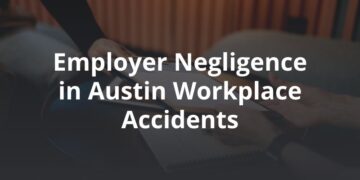When most people think of negligence, what comes to their mind is usually civil negligence. Fans of television’s longest-running medical drama may remember an important decision faced by Meredith Grey and other survivors of the plane crash way back in season nine — settle with the insurance company or sue for civil negligence. Even people without a legal background tend to have a fairly good idea of the basics of negligence when it comes to personal injury law.
The writers may have taken some creative liberties with the timeline and details — most lawyers would love a ruling in favor of the plaintiffs on the first day. Still, this storyline is a good example of the way that the work of injury attorneys fits into the everyday fabric of our lives. Read on to learn more about the differences between civil and criminal negligence.
If you’re facing a personal injury case in Austin, consulting with an experienced Austin personal injury lawyer can provide you with the guidance and support you need to navigate the legal process effectively.
What Are Some Criminal Negligence Examples?
What is criminal negligence? A criminal negligence definition is a form of reckless behavior where a person has ignored obvious risks, disregarding the lives of other people.
Is negligence a crime? This is a complicated legal definition that is not a specific crime itself. Instead, the Texas Penal Code uses a standard known as mens rea, or “guilty mind,” to determine if they have committed a criminal offense.
What are the 4 culpable mental states?
There are four degrees of what the law calls culpable mental states:
- Intent. The highest degree of legal culpability, when someone knowingly and intentionally commits a dangerous act that harms someone else.
- Knowledge. The second highest degree of culpability, when a person knows their actions are likely to harm someone else and acts anyway.
- Recklessness. The third highest degree of culpability, when a person knows their behavior is dangerous and still engages in the dangerous behavior.
- Negligence. The mildest degree of culpability, when a person fails to act in a way that is reasonable and expected in the circumstances.
Criminal negligence is when it is determined that, under the specific circumstances, a person should have been “aware of a substantial and unjustifiable risk.” The legal standard for criminal negligence is open to a degree of interpretation, but ultimately one of two standards must be met:
- Behavior that departs significantly from how a reasonable person would act in a similar situation
- Outrageous behavior that directly created the risk of danger
When a person’s behavior is so far outside the scope of the kind of tragic mistakes made by a reasonable person under similar circumstances, it might fall under criminal negligence. What is considered reasonable depends on the circumstances, the person’s knowledge, training, education, or other factors.
What Are Common Examples of Criminal Negligence?
Criminal negligence can be a factor in a number of different dangerous situations. Here are some common examples of criminal negligence:
- Firing a gun into the air at a party
- Leaving a loaded weapon in reach of a child
- Swiping at a loaded weapon in someone’s hand
- Texting and speeding while driving a car
- Killing a person while recklessly drunk driving
- Leaving a child unattended in a hot car
While criminal negligence is not itself a crime, it is tragically common, especially injuries and deaths caused by speeding, drunk driving, and other criminally reckless behavior.
How Are Civil and Criminal Negligence Different?
Any legal determination of negligence acknowledges that a person’s actions were not intentional and that the harm caused was accidental. However, there is a difference between civil and criminal negligence. The first step in understanding these differences is understanding the difference between civil and criminal cases.
- Civil courts handle disputes between private parties, such as when an individual files a lawsuit against a business
- Criminal courts handle disputes where a person’s behavior is found to have a greater risk to the public good, such as drunk driving
Both civil and criminal decisions are legally binding, and sometimes it can be a fine line between what makes a negligent act a civil or criminal matter. In cases of civil negligence, the harm caused is the result of a mistake in judgment, inattention, or simple carelessness. While the liable party is still responsible for what happened, their actions are not so egregious as to cross the line into a criminal act.
What Are the Penalties for Negligence?
Another difference between civil and criminal negligence is potential punishment. When a person or organization is found to have acted with civil negligence, they have to pay monetary damages. The punishment for criminal negligence can include monetary penalties, but it can also include probation, community service, and incarceration.
Negligent manslaughter accounts for only a small percentage of people who are incarcerated in state facilities across the country. In 2018, 1.4 percent of male prisoners and 2.8 percent of female prisoners were incarcerated for negligent manslaughter.
In many cases, people who are found responsible for gross negligence, regardless of whether they serve time in jail, can be held responsible financially, as well. They might be responsible for:
- Economic damages. These damages are compensatory damages intended to compensate for actual economic losses, such as medical bills, lost income, and property damage.
- Non-economic damages. These damages are awarded for the purpose of compensating a claimant for damages like physical pain and suffering, mental or emotional pain or anguish, loss of consortium, disfigurement, physical impairment, loss of companionship and society, inconvenience, loss of enjoyment of life, and injury to reputation.
- Exemplary damages. These are also called punitive damages, and these are awarded as punishment for especially bad behavior that results in harm.
Is Negligence Federal or State Law?
Laws around negligence are largely determined at the state level. Under the Federal Tort Claims Act (FTCA), even in cases of negligence by representatives of the federal government, the federal government has jurisdiction but will still apply the laws of the state where the negligent act occurred.
Is criminal negligence a felony? In Texas, criminally negligent homicide is one of the four kinds of criminal homicide, and it is a felony punishable by incarceration in a state jail. While there is room in the Texas legal code for applying the law in a variety of circumstances, Texas law also specifies some instances of criminally negligent behavior. For example, a person who makes a “readily dischargeable firearm” to a child who then discharges the firearm and causes death or serious bodily injury would be committing a criminally negligent offense.
When Should You Hire A Criminal Negligence Attorney?
When families have been affected by a tragedy, especially when a crime has been committed, hiring a lawyer may be the last thing on their minds. However, legal representation can help families make sure that laws are being applied to the extent that is fair and just.
Whether a drunk driving accident or a firearm accident, people who have been injured as a result of criminally negligent behavior have rights under Texas law, such as the Crime Victims’ Compensation Program. This fund covers a variety of costs associated with being the victim of a crime, including:
- Counseling
- Medical treatment
- Funeral costs
- Loss of income
The fund covers these expenses under certain conditions up to $50,000. There are also some costs that are not covered under the Crime Victims’ Compensation Program. These include:
- Property theft, damage, or loss
- Identity theft costs
- Pain, suffering, or emotional distress
However, this fund is also considered a last source of payment. That means that costs will be covered only after other collateral means of funding have been accessed:
- Medical insurance
- Dental Insurance
- Auto insurance
- Workers’ compensation
- Civil settlements
Hiring an attorney is one way to ensure that each available source of personal injury compensation is made available when it is needed.
How Can an Experienced Attorney Like FVF Help?
Contacting an attorney as soon as possible is the best way to become educated on your rights and options. This is true whether the goal is to make sure that justice is served in criminal court or to understand options related to financial compensation. By contacting an Austin car accident lawyer, you’ll better understand:
- Options for obtaining additional medical care
- Options for handling any medical bills you’ve received so far
- Options for handling any future medical costs you might require because of your injuries
- Options for handling insurance companies and adjusters
- Options for handling lost income
- What benefits you might have available from your own insurance policies
- How personal injury lawyers are compensated for their efforts
- Whether an attorney will add value to your case
FVF Law Firm – Injury & Wrongful Death Lawyers case consultations are always at no cost to you. Our goal for our initial conversation with you is that you feel informed enough to make a decision about whether to proceed with your case — whether you hire us to represent you or not.
FVF accepts cases only when we believe we can add substantial value to your claim, and we work on a contingency fee basis, so you always know what to expect when it comes to our fee for securing your recovery. Contact us today to schedule your free consultation.






